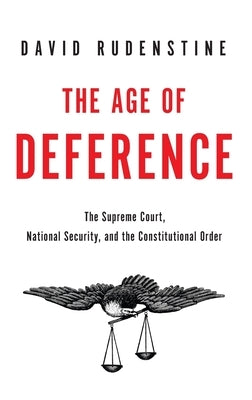Oxford University Press, USA
The Age of Deference: The Supreme Court, National Security, and the Constitutional Order
The Age of Deference: The Supreme Court, National Security, and the Constitutional Order
Couldn't load pickup availability
the government claimed that releasing information relating to the crash would reveal important state secrets, and refused to hand over the requested documents. Judges at both the U.S. District Court level and Circuit level rejected the government's argument and ruled in favor of the families.
However, in 1953, the Supreme Court reversed the lower courts' decisions and ruled that in the realm of national security, the executive branch had a right to withhold information from the public. Judicial deference to the executive on national security matters has increased ever since the issuance
of that landmark decision. Today, the government's ability to invoke state secrets privileges goes unquestioned by a largely supine judicial branch. David Rudenstine's The Age of Deference traces the Court's role in the rise of judicial deference to executive power since the end of World War II. He shows how in case after case, going back to the Truman and Eisenhower presidencies, the Court has ceded authority in national security matters to the
executive branch. Since 9/11, the executive faces even less oversight. According to Rudenstine, this has had a negative impact both on individual rights and on our ability to check executive authority when necessary. Judges are mindful of the limits of their competence in national security matters;
this, combined with their insulation from political accountability, has caused them in matters as important as the nation's security to defer to the executive. Judges are also afraid of being responsible for a decision that puts the nation at risk and the consequences for the judiciary in the wake
of such a decision. Nonetheless, The Age of Deference argues that as important as these considerations are in shaping a judicial disposition, the Supreme Court has leaned too far, too often, and for too long in the direction of abdication. There is a broad spectrum separating judicial abdication,
at one end, from judicial usurpation, at the other, and The Age of Deference argues that the rule of law compels the court to re-define its perspective and the legal doctrines central to the Age.
Author: David Rudenstine
Publisher: Oxford University Press, USA
Published: 08/17/2016
Pages: 344
Binding Type: Hardcover
Weight: 1.25lbs
Size: 9.30h x 6.50w x 1.30d
ISBN: 9780199381487
About the Author
David Rudenstine served as Dean of the Cardozo School of Law from 2001-09, and is currently the Sheldon H. Solow Professor of Law at Cardozo, where he has taught constitutional law since 1979. The first dean appointed from the ranks of the Cardozo faculty, Professor Rudenstine is an American legal scholar respected for his work on free press, free speech, and national security issues. He is the author of The Day the Presses Stopped: A History of the Pentagon Papers Case, which was nominated for a Pulitzer Prize, and he is currently writing a book on the role of courts in national security cases. In recent years, he has organized and participated in legal panels on subjects such as the disclosures made by Edward Snowden and Wikileaks, the NSA Surveillance Programs, and the ACLU in American Life. In 2000-01, he was an inaugural fellow in Princeton University's Program in Law and Public Affairs.


